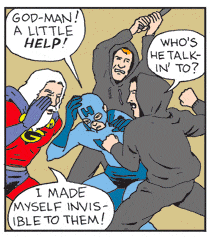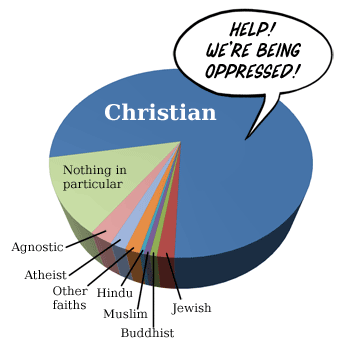“If I Perish, I Perish”
Daniel 1; 3; 6; Esther 3–5; 7–8
LDS manual: here
Reading
God’s been terrible lately in the Old Testament. He’s been messing around with his prophets, making them do weird things, and basically threatening to kill the whole world. I’ve just been waiting to see if he’ll do something nice for someone, sort of like Erin Brockovich’s boyfriend did before he left. Well, in this lesson, we finally get to see the nicer side of Jehovah, with the stories of Daniel and Esther.
Ch. 1: Daniel and friends are captured by the Babylonians, who are surprised to find that Jews can be vegan. The prince of the eunuchs asks, “Where do you get your protein?” He doesn’t want them to keep their diet, but in a sudden burst of science, a test is proposed, and Daniel and his friends look healthier than the kids who eat meat.
Ch. 3: Daniel’s friends Shadrach, Meshach, and Abednego refuse to worship king Nebuchadnezzar’s idol, and are cast into a fiery furnace. Because the fire’s so hot, it kills the men throwing them in. But that’s collateral damage, and they’re not Jews anyway, so it doesn’t count. This begins a long tradition of not caring much about minions.
The king looks into the fire and sees:
3:25 He answered and said, Lo, I see four men loose, walking in the midst of the fire, and they have no hurt; and the form of the fourth is like the Son of God.
This verse is noteworthy for the appearance of the concept of God having a son, but what’s really impressive is how perceptive Nebuchadnezzar is. How was he supposed to know what the Son of God would look like? There’s only one explanation: everyone in this story is freaking high.
Ch. 6: Daniel himself is thrown to the lions when he prays in defiance of the king. Nothing bad happens to him because God always intervenes in favor of those who believe in him.
Wait, does that mean that God just nullified the agency of everyone who saw the event? It must have been such an amazing rescue that those who saw it would have no choice but to believe! At least, that’s what people always tell me when I ask why God can’t give sufficient evidence for his existence. God requires faith, which evidence would nullify.
But this is a silly rationale. The scriptures are full of stories like this, where God rescues people who have faith in him. So if you have faith, but you don’t get rescued, you might well ask: What am I, chopped liver? Unless you die, in which case you can’t ask anything at all. And this is why God seems better than he is: lots of people are walking around thinking God saved them; dead people aren’t around to give the other side of the story.
There’s nothing supernatural about the story of Esther; in fact, terms like God and Lord never appear. As a consequence, it’s quite enjoyable to read. It’s rather similar to Daniel in theme: the Jews are threatened with extinction, but Esther saves the day. This will get rebooted into tales of destruction in the Book of Mormon, including burning the people of Ammonihah alive (Alma 14), and the wicked Nephites planning to put all the believers to death (3 Ne 1)
Main points from this lesson
God protects his people, but don’t expect protection
The king asks Shadrach, Meshach, and Abednego what they’ll do if he decides to burn them. And where’s their god now?
3:15 Now if ye be ready that at what time ye hear the sound of the cornet, flute, harp, sackbut, psaltery, and dulcimer, and all kinds of musick, ye fall down and worship the image which I have made; well: but if ye worship not, ye shall be cast the same hour into the midst of a burning fiery furnace; and who is that God that shall deliver you out of my hands?
The answer of the boys is interesting.
3:16 Shadrach, Meshach, and Abednego, answered and said to the king, O Nebuchadnezzar, we are not careful to answer thee in this matter.
3:17 If it be so, our God whom we serve is able to deliver us from the burning fiery furnace, and he will deliver us out of thine hand, O king.
3:18 But if not, be it known unto thee, O king, that we will not serve thy gods, nor worship the golden image which thou hast set up.
As a believer, this always seemed very moderate and mature. You shouldn’t expect God to protect you. As Neil Maxwell said,
“We will [not] always be rescued from proximate problems, but we will be rescued from everlasting death!”
Meanwhile, Neil Maxwell is still dead.
To me now, this seems like a dodge. You might expect God to protect you, but if he doesn’t feel like it for some reason, that doesn’t mean he’s failed or he doesn’t exist or anything. It’s a good excuse for explaining away a lack of results, or explaining why a god who does nothing might possibly exist.
So which is it? If he doesn’t intervene, how can they be sure he exists? And if he does intervene, why does he do so in such a selective fashion?
Persecution complexes
As a kid in the Mormon Church, there were two doctrinal constants:
- Don’t ever drink alcohol
- They’re coming to get us.
No shit; some teacher once tried to terrify a class full of us by telling a hypothetical story about how our neighbours went berserk and decided to burn all the Mormons to death in a huge fire — naming each of us by name during the story — and would we be strong enough to be killed for our faith? WOULD WE?
What I didn’t realise was that our neighbours couldn’t have cared less about our goofy religion; they just wished we wouldn’t bug them so much about it. That didn’t stop us from incorporating imaginary future persecution into our worldview.
After all, why was Joseph Smith persecuted? This was never clear to me as a Mormon kid, though it seemed to be satanic in origin. I’d often hear that Joseph could have made the persecution stop at any time, just by denying the Book of Mormon and the First Vision — and that means he really believed it and it must be true. Post-polygamy-essays, I now see that for the distortion it is. If Joseph had denied the Book of Mormon or the First Vision, that wouldn’t have stopped the persecution because the persecution was never about those things. He was persecuted because he was bilking people out of their money, abusing his position as a religious leader, marrying girls and wives, planning the assassination of a governor, and destroying printing presses. Trumped-up charges? Hardly.
The early Mormons were persecuted in Illinois and Missouri, but this didn’t exactly come out of nowhere, nor was it entirely unreciprocated. Here’s a page listing some of the factors — Caution: it’s a Christian site.
The two stories in today’s reading are used to fuel paranoia and a persecution complex among believers. In the story of Daniel, anyone who refuses to worship Nebuchadnezzar’s image gets the fiery furnace, and anyone who prays gets lions.
As for Esther, Haman gets king Ahasuerus to agree to genocide against the Jews.
3:13 And the letters were sent by posts into all the king’s provinces, to destroy, to kill, and to cause to perish, all Jews, both young and old, little children and women, in one day, even upon the thirteenth day of the twelfth month, which is the month Adar, and to take the spoil of them for a prey.
Note that in past chapters, when the Israelites are commanded to commit genocide against their neighbours, this is just another day in the Old Testament. But when it’s the Jews thenselves that are endangered, this is meant to be biblically terrible. At this stage, having read this much of the OT, this kind of myopia shouldn’t be surprising.
Let’s not forget that in many places in the world, religious persecution is very real, against Christians, against Jews, against all sorts, including atheists.
That aside, imagining persecution is one thing that American Christians are really good at. It’s given rise to the War on Christmas, in which Christians imagine that their 11-month holiday, enthusiastically celebrated by everyone, is being prohibited because they can’t force everyone to make it explicitly Christian.
All too often, it’s Christians who are unwilling to give up the religious privilege that they’ve historically enjoyed. Here are Christians interrupting a public prayer in the US Senate when it’s a Hindu’s turn.
and here’s a Christian interrupting a Muslim giving a prayer at a Christian cathedral.
Even Buddhists, who many of us would consider placid and tolerant, can become murderous when their dominance is threatened.
It’s especially rich when US Christians claim that persecution is happening at the hands of atheists.
In the words of this possibly fictional youth pastor:
Ask: What can we learn from these cases?
Answers: Religious majorities can very easily become tyrannical.
Read Article 18 of the UN Declaration of Human Rights. What does it say about religion?
Everyone has the right to freedom of thought, conscience and religion; this right includes freedom to change his religion or belief, and freedom, either alone or in community with others and in public or private, to manifest his religion or belief in teaching, practice, worship and observance.
Notice also Article 20:
(2) No one may be compelled to belong to an association.
Atheists and non-believers must be committed (somewhat ironically) to upholding religious pluralism and the right to join, leave, or switch to any religion (or none), while upholding secular principles in government, schools, and workplaces.






Recent Comments